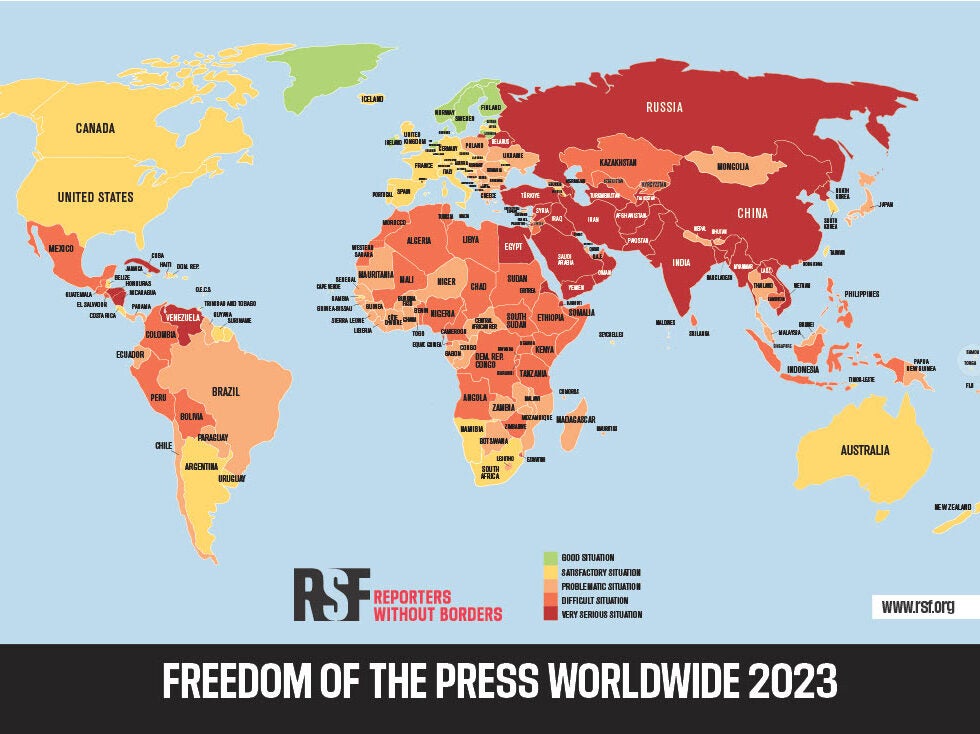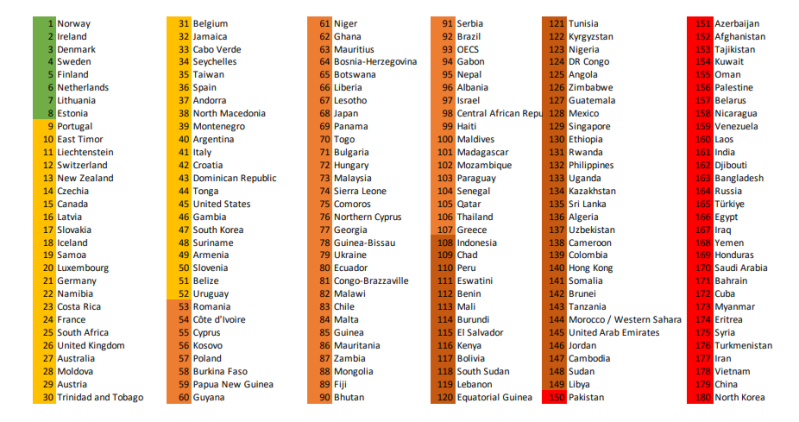
Reporters Without Borders (RSF) says that the “fake content industry” has increased “volatility” in its World Press Freedom Index rankings for 2023.
This year’s report shows the number of countries deemed “satisfactory” for their treatment of journalists rising slightly, but so does the number where the situation is “very serious”.
RSF’s secretary-general said this year’s index was characterised by “major falls and unprecedented changes”.
Overall, the 21st edition of the index puts the environment for journalism as “bad in seven out of ten countries, and satisfactory in only three out of ten”, RSF said in a release.
RSF secretary-general Christophe Deloire said: “The World Press Freedom Index shows an enormous volatility in situations, with major rises and falls and unprecedented changes, such as Brazil’s 18-place rise and Senegal’s 31-place fall.
“This instability is the result of an increased aggressiveness on the part of the authorities in many countries and a growing animosity towards journalists on social media and in the physical world.”
Deloire also cited the growth of the “fake content industry” as a factor, referencing revelations reported by RSF-founded Forbidden Stories about “Team Jorge”, a group alleged to have used misinformation to manipulate elections.
RSF said that in 118 of the countries surveyed, “most of the Index questionnaire’s respondents reported that political actors in their countries were often or systematically involved in massive disinformation or propaganda campaigns”.
The UK ranked 26th in the Index this year, a slight decline from 24th last year. But that ranking preserves an improvement on previous years, when the country came in at 33rd (2021) and 35th (2020).
The UK’s score was depressed, RSF said, by a continued “lack of pluralism” and “a restrictive political climate”. The approval of Julian Assange’s extradition to the US and the arrest of journalists by police, as well as legislative inaction over SLAPPs (strategic lawsuits against public participation) were specifically cited as issues.
Ireland meanwhile jumped four places to second, behind only Norway, which notched its seventh-straight year at the top spot.
The US fell three spots to 45th, with RSF citing economic and legal issues as contributing factors. Those included the attempt to extradite Assange, “a growing push to revisit the landmark Sullivan v New York Times decision, which largely shields the media from defamation lawsuits” and widespread closures and redundancies across the US news industry.
RSF said: “The Index questionnaire’s US respondents were negative about the environment for journalists (especially the legal framework at the local level, and widespread violence) despite the Biden administration’s goodwill.” The murder of two journalists, Jeff German and Dylan Lyons, also weighed on the US’ score.
Russia, where the government has largely completed its quelling of independent media, fell nine places to 164th. Despite the Russian invasion and its own issues with oligarchs, Ukraine rose 27 places to 79th.
[Read more: Kyiv Independent editor on how reader support trumped oligarch cash]
Brazil rose 18 spots to 92nd, accounted for in large part by the departure of far-right Jair Bolsonaro from office. RSF said changes in governments “also improved the environment for the media and accounted for such significant rises in the Index as Australia’s (up 12 at 27th) and Malaysia’s (up 40 at 73rd)”.
Vietnam (178th), China (179th) and North Korea (180th) occupied the lowest three spots. Iran, which has implemented a civil and press crackdown amid protests surrounding the death of Mahsa Amini, dropped to 177th.
Falls were also recorded in India, which fell 11 places to 161st (“media takeovers by oligarchs close to Prime Minister Modi have jeopardised pluralism”) and Turkey, which dropped 16 spots to 165th (“the Erdogan administration in Turkey has stepped up its persecution of journalists in the run-up to elections scheduled for 14 May”).
Regionally, no countries in the Maghreb and Middle East region were rated “satisfactory” or better. Just over half the countries in the region were rated “very serious”.
The Americas meanwhile no longer have a single “good” rated country, with Costa Rica, previously the only one designated as such, dropping 15 places to 23rd because of a decline in its political score.
The report also makes brief mention of Twitter proprietor Elon Musk, accusing the mercurial tech baron of “pushing an arbitrary, payment-based approach to information to the extreme, showing that algorithms are quicksands for journalism”.

Email pged@pressgazette.co.uk to point out mistakes, provide story tips or send in a letter for publication on our "Letters Page" blog
